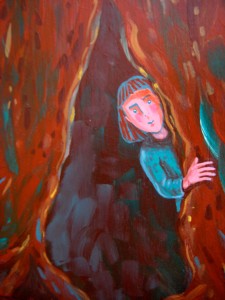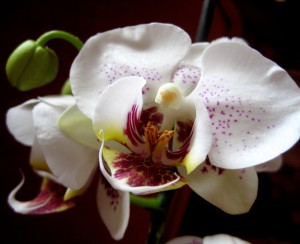
– Art by Jan Ketchel
How do we establish our domain? How do we achieve dominion over our domain? I refer here to the domain of self, a room with four strong walls, the square of self.
We are beings of the circle, the infinite. We arrive at the gateway to this world through a triangle, the offspring of two, as two become three at our birth. From the circle of infinity we become finite. Born into a triangle, we are challenged next to carve out the four walls of our domain of self, as beings separate from the triangle of our birth.
If we are to fully mature into our four-walled self, we must all experience the disbanding of the original triangle. Freud spent his career focusing on the original triangle and its dominion over us. Only with the phallic power of the sword, male or female, are we afforded the clarity and power to cut through that triangle—with its myths of the nursery, the residual failures, broken promises, and legacy of expectations of those gods who bore us—and establish a new domain of self. Incredible clouds of sorrow hover over our lives as we experience the abandonment of and disconnect from those primal energies that conceived us, themselves tricked by the blissful myths of the garden or the raging energies of power and lust.
So powerful are the energies of the triangle that the ancient world literally used the sword to circumcise the self from the triangle and free it to new fraternity in the greater tribe. The sword of the modern world shines largely in the penetrating impact of awakening consciousness that can cut through the dated myths of attachment that cloud our true selves.
Sorrow is the underlying, overriding emotion that we must bear yet transmute. Sorrow pulls us backward into the deep abyss of what was or wasn’t, as we seek to forever hold onto that which once was, or finally find that which never was. Sorrow is an endless whirlpool that draws us deeper into a morass of bottomless emptiness. It may be necessary to traverse that journey, but beware, there is no bottom, and sorrow renews itself with equal potency at each visitation.
The transmutation of sorrow is the willingness to sit in the aloneness of the room of the four-walled self, to breathe, to feel the integrity of self without censoring thoughts or feelings, but indulging none as well. In this space of the four-walled room of the self we accept that we are participants in an unfathomable mystery. We accept that we have no control over the changes nor the inevitable losses and gains in our lives. We discover that we’re travelers with invitations to participate in this world, but never to stay.

knowing full well that our time is as limited as a blossom’s?
– Photo by Jan Ketchel
Can we grant ourselves the dominion to show up and fully participate, knowing full well that it will all change and that our one true traveling companion is the self in the four-walled room?
Can we allow ourselves to release even that self when it’s time to once again journey in the circle of infinity? Can we step into that circle of infinity now, while we still ride the chariot of our four-wheeled self? Can we live in both worlds now? Freely? Ah, what will we see!
When sitting alone within the four-walled self, it’s beneficial to establish a reliable practice to support the sword-cutting process of separation, individuation, and exploration. As we face our four-walled self what sharper technique is there than meditation to cut through the sorrows that are sure to plague us?
Here is a link to a simple and direct meditation practice, offering first steps, as well as deepening techniques dedicated to the process of sitting within the four-walled self: Son Meditation. I encourage you to give it a try as you seek to establish your domain of self.
From within my domain,
Chuck

